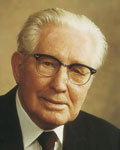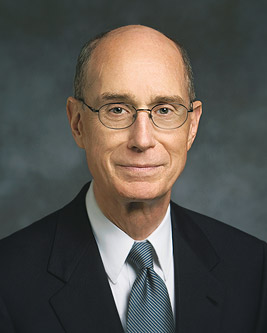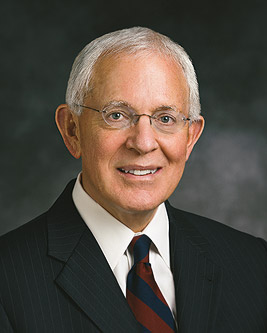SEARCH BY TITLE
![ArtBook__134_134__EzraTaftBenson____[1]](http://ldsminds.com/wp-content/uploads/2013/10/ArtBook__134_134__EzraTaftBenson____1-e1403389404661.jpg) Beware of Pride
Beware of Pride
Pride is a very misunderstood sin, and many are sinning in ignorance. In the scriptures there is no such thing as righteous pride—it is always considered a sin. Therefore, no matter how the world uses the term, we must understand how God uses the term so we can understand the language of holy writ and profit thereby. Most of us think of pride as self-centeredness, conceit, boastfulness, arrogance, or haughtiness. All of these are elements of the sin, but the heart, or core, is still missing. The central feature of pride is enmity—enmity toward God and enmity toward our fellowmen. Enmity means “hatred toward, hostility to, or a state of opposition.” It is the power by which Satan wishes to reign over us. Pride is essentially competitive in nature. We pit our will against God’s. When we direct our pride toward God, it is in the spirit of “my will and not thine be done.” As Paul said, they “seek their own, not the things which are Jesus Christ’s.” Our will in competition to God’s will allows desires, appetites, and passions to go unbridled. The proud cannot accept the authority of God giving direction to their lives. They pit their perceptions of truth against God’s great knowledge, their abilities versus God’s priesthood power, their accomplishments against His mighty works. Our enmity toward God takes on many labels, such as rebellion, hard-heartedness, stiff-neckedness, unrepentant, puffed up, easily offended, and sign seekers. The proud wish God would agree with them. They aren’t interested in changing their opinions to agree with God’s. Another major portion of this very prevalent sin of pride is enmity toward our fellowmen. We are tempted daily to elevate ourselves above others and diminish them. The proud make every man their adversary by pitting their intellects, opinions, works, wealth, talents, or any other worldly measuring device against others. In the words of C. S. Lewis: “Pride gets no pleasure out of having something, only out of having more of it than the next man. … It is the comparison that makes you proud: the pleasure of being above the rest. Once the element of competition has gone, pride has gone.”
![ArtBook__134_134__EzraTaftBenson____[1]](http://ldsminds.com/wp-content/uploads/2013/10/ArtBook__134_134__EzraTaftBenson____1-e1403389404661.jpg) Cleansing the Inner Vessel
Cleansing the Inner Vessel
May I now discuss a subject of grave concern that deserves deeper development than we have time. It is the subject of pride. In the scriptures there is no such thing as righteous pride. It is always considered as a sin. We are not speaking of a wholesome view of self-worth, which is best established by a close relationship with God. But we are speaking of pride as the universal sin, as someone has described it. Mormon writes that “the pride of this nation, or the people of the Nephites, hath proven their destruction.” The Lord says in the Doctrine and Covenants, “Beware of pride, lest ye become as the Nephites of old.” Essentially, pride is a “my will” rather than “thy will” approach to life. The opposite of pride is humbleness, meekness, submissiveness, or teachableness. In the early days of the restored church, the Lord warned two of its prominent members about pride. To Oliver Cowdery, He said, “Beware of pride, lest thou shouldst enter into temptation.” To Emma Smith, He said, “Continue in the spirit of meekness, and beware of pride.” “Thou shalt not be proud in thy heart,” the Lord warns us. “Humble yourselves before God,” says the Book of Mormon. When the earth is cleansed by burning in the last days, the proud shall be as stubble. The great and spacious building which Lehi saw was the pride of the world where the multitude of the earth was gathered. Those who walked the straight and narrow path and held onto the word of God and partook of the love of God were mocked and scorned by those in the building. “The humble followers of Christ” are few. Pride does not look up to God and care about what is right. It looks sideways to man and argues who is right. Pride is manifest in the spirit of contention. Was it not through pride that the devil became the devil? Christ wanted to serve. The devil wanted to rule. Christ wanted to bring men to where He was. The devil wanted to be above men. Christ removed self as the force in His perfect life. It was not my will, but thine be done. Pride is characterized by “What do I want out of life?” rather than by “What would God have me do with my life?” It is self-will as opposed to God’s will. It is the fear of man over the fear of God. Humility responds to God’s will—to the fear of His judgments and the needs of those around us. To the proud, the applause of the world rings in their ears; to the humble, the applause of heaven warms their hearts.
 The Currant Bush
The Currant Bush
You sometimes wonder whether the Lord really knows what he ought to do with you. You sometimes wonder if you know better than he does about what you ought to do and ought to become. I am wondering if I may tell you a story that I have told quite often in the Church. It is a story that is older than you are. It’s a piece out of my own life, and I’ve told it in many stakes and missions. It has to do with an incident in my life when God showed me that he knew best. . . I arose from my knees a humble man. And now, almost fifty years later, I look up to him and say, “Thank you, Mr. Gardener, for cutting me down, for loving me enough to hurt me.” I see now that it was wise that I should not become a general at that time, because if I had I would have been senior officer of all western Canada, with a lifelong, handsome salary, a place to live, and a pension when I’m no good any longer, but I would have raised my six daughters and two sons in army barracks. They would no doubt have married out of the Church, and I think I would not have amounted to anything. I haven’t amounted to very much as it is, but I have done better than I would have done if the Lord had let me go the way I wanted to go.
 Our Hearts Knit As One
Our Hearts Knit As One
A second principle to guide our progress to become one is to be humble. Pride is the great enemy of unity. You have seen and felt its terrible effects. Just days ago I watched as two people—good people—began with a mild disagreement. It started as a discussion of what was true but became a contest about who was right. Voices became gradually louder. Faces became a little more flushed. Instead of talking about the issue, people began talking about themselves, giving evidence why their view, given their great ability and background, was more likely to be right. You would have felt alarm as I did. We have seen the life-destroying effects of such tragic conflict. You and I know people who left the fellowship of the Saints over injured pride. Happily I am seeing more and more skillful peacemakers who calm troubled waters before harm is done. You could be one of those peacemakers, whether you are in the conflict or an observer. One way I have seen it done is to search for anything on which we agree. To be that peacemaker, you need to have the simple faith that as children of God, with all our differences, it is likely that in a strong position we take, there will be elements of truth. The great peacemaker, the restorer of unity, is the one who finds a way to help people see the truth they share. That truth they share is always greater and more important to them than their differences. You can help yourself and others to see that common ground if you ask for help from God and then act. He will answer your prayer to help restore peace, as He has mine.
 To Walk Humbly with Thy God
To Walk Humbly with Thy God
Twelve years ago President Ezra Taft Benson delivered a powerful conference address declaring that pride is “the universal sin, the great vice.” He taught that pride is essentially competitive in nature and made reference to this quote from C. S. Lewis: “Pride gets no pleasure out of having something, only out of having more of it than the next man. We say that people are proud of being rich, or clever, or good-looking, but they are not. They are proud of being richer, cleverer, or better-looking than others. If every one else became equally rich, or clever, or good-looking there would be nothing to be proud about. It is the comparison that makes you proud: the pleasure of being above the rest. Once the element of competition has gone, pride has gone.” What an interesting commentary on today’s highly competitive and thus prideful world. What an important reminder as well, for those of us who are blessed with the fulness of the gospel, to avoid both the condition and appearance of haughtiness or condescension in all of our human relationships. I think sometimes of what life would be like if we all possessed greater humility.
